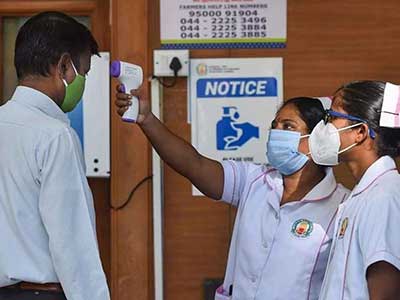Date: 01/05/2023
Relevance: GS-2: Welfare schemes for vulnerable sections of the population by the Centre and States and the performance of these schemes; mechanisms, laws, institutions and Bodies constituted for the protection and betterment of these vulnerable sections.
Key Phrases: Nursing Colleges, Healthcare Facilities, AIIMS, Healthcare Sector, Remittance, World Health Organisation, Medical Care.
Context:
- Expanding nursing colleges is a positive move, but there is a need to improve the skill sets of nursing professionals as well.
Key Highlights
- India is currently facing a severe healthcare crisis, with the demand for medical services far exceeding the supply. This situation is further exacerbated by the shortage of nursing professionals in the country.
- The quality of healthcare in India is often below par, and patients struggle to get access to basic care. The government's recent announcement to set up 157 nursing colleges to address the shortage of nursing professionals in the country is a welcome move.
- However, this initiative is just the beginning of the country's efforts to equip its healthcare facilities with the requisite caregiving expertise.
The Current Situation
- India's healthcare professionals are severely under-resourced.
According to official estimates, India currently has less than two nurses
for every 1,000 people in the country.
- This figure is far below the World Health Organization's (WHO) recommended number of three nurses for every 1,000 people.
- However, this figure is a conservative estimate, and the number of allied healthcare professionals needs to increase eight times to meet the country's needs over the next 25 years.
- India's population is expected to reach 1.5 billion by 2030, which creates a massive demand for healthcare professionals.
The Skew in Nursing Education
- More than 40% of nursing colleges in India are located in southern states such as Kerala, Andhra Pradesh, Tamil Nadu, and Karnataka, which has created a significant skew in the distribution of nursing education.
- This issue has been addressed to some extent by the allotment of
new nursing colleges to Rajasthan, Uttar Pradesh and Madhya Pradesh.
- However, there is still a long way to go to ensure equitable distribution of nursing education for healthcare facilities across the country.
Skills to Be Taught
- Increasing the number of nursing professionals is one part of
addressing the healthcare crisis in India.
- The other requirement is to equip these caregivers with the necessary skill sets required in a medical setup.
- Medical setups throw up new challenges, and old problems remain
unresolved. Proper communication training could help resolve the acrimony
between patients and healthcare professionals.
- The nursing cadre must also familiarize themselves with the rapidly changing technologies in medical care, which would help equip them to work autonomously.
- Experts suggest that institutes in India currently do not provide
nurses with adequate training to take up leadership positions.
- The Indian nursing education curriculum needs to be revamped to achieve this, and continuous upskilling must be provided to maintain competency.
Improving Remittances and Revenue Generation
- Migrant nurses, most of them from southern states, have been a
significant source of remittance.
- These professionals are in high demand in hospitals in Europe, the Americas, and West Asia.
- Investing in nursing education will help enhance the
revenue-generating capacity of potential migrants.
- This will promote the emigration of highly skilled professionals, which would increase opportunities for Indian professionals outside the country.
Conclusion
- The Indian government's decision to set up 157 new nursing
colleges is a positive step in addressing the healthcare crisis in the
country.
- However, it is essential to ensure that the education imparted in these colleges is of high quality, and students have access to the latest technologies and trends in the field.
- It is equally crucial to ensure that nursing professionals are
given proper communication training, familiarised with rapidly changing
technologies in medical care, and equipped to work autonomously.
- Additionally, the upskilling of nurses to take on leadership positions must be done through continuous training.
- The nursing curriculum in India needs to be revamped to ensure
that it is in line with the latest healthcare trends and technologies.
- Institutes should focus on providing theoretical and practical knowledge to nursing students, covering all aspects of healthcare, including geriatric care, pediatrics, and critical care.
Source: The Indian Express
Mains Question:
Q: "Examine the potential benefits and challenges of public-private partnerships (PPPs) in reforming the nursing education system in India and addressing the healthcare crisis in the country." (150 words).







